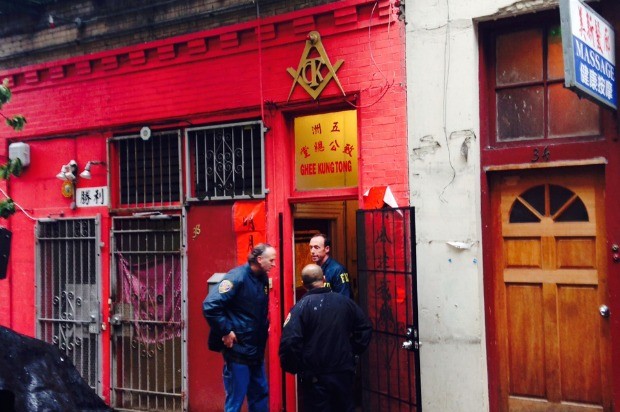
The federal contractor charged with holding and distributing the vast majority of evidence in the Sen. Leland Yee corruption trial — evidence now under a government gag order, and unavailable to the public — was burgled on May 25, according to documents obtained by the the SF Appeal.
The break in at the contractor called Colour Drop, located at 727 Van Ness Ave., occurred at around 3:30 AM on May 25, when a still-at-large crook(s) smashed a large commercial window on the north side of the building and entered the premises from there.
After the store’s alarm warned the police of a break in, a Colour Drop employee was called to the scene three hours later, once SFPD officers had arrived. After examining the premises, the employee told the responding officers that nothing appeared to be missing.
CSI was called to dust for prints, and the responding officers took several photographs of the crime scene. The SFPD wasn’t unable to retrieve video surveillance footage from Colour Drop at the time, according to the police report from the incident.
Colour Drop did not respond to several phone calls and emails requesting comment.
Nowadays, most of the evidence in complex cases involving hundreds of pages of documents, wiretap surveillance, and video footage is transferred from federal prosecutors to the defense teams in electronic format. In multi-defendant cases that may require hundreds of CDs or DVDs to transfer evidence, often multi-terabyte encrypted drives are used instead. Drives or discs are then duplicated at several facilities throughout the region — Colour Drop being one such federal contractor.
“The entire system of e-discovery is often overlooked,” Bryan Reuter, a Colour Drop employee has told this reporter in the past, “In actuality there are hundreds of geek hours on the backend.”
The weekend of the May 24-25 was the first weekend the federal contractor was in possession of the full body of evidence involved in the ongoing FBI investigation into Raymond “Shrimp Boy” Chow, Sen. Leland Yee and 27 other defendants, according to Curt Briggs, one of Chow’s lawyers.
“We are concerned about other break-ins surrounding this case because history has shown that they are not uncommon in prosecutions involving high level politicians. We have not been informed whether the FBI is even investigating this breach. The murky details of this break in are alarming,” Briggs said.
The Northern California US Attorney’s is aware of the break in — and has evidently seen the surveillance footage that the SFPD was unable to retrieve at the scene. Reached by telephone Tuesday afternoon a spokesman was reluctant to discuss details of its security procedures, concerned that they might be compromised in the future.
“We will not comment on the specific security measures in place at Colour Drop,” a spokesman said in an emailed statement the following day. “Nevertheless, our security protocol with venders, including disk encryption, among many other protections, should make any efforts to illegally gain access to discovery lodged for defense counsel unsuccessful.”
Public access to the evidence in the Sen. Leland Yee corruption case has been hotly contested in court as of late. After weeks of back and forth between Shrimp Boy’s defense team and government prosecution, Judge Charles Breyer ultimately decided in favor of placing a protective order on all of the evidence in question, according to a document filed May 19.
The judge’s reasoning includes protecting the identity of the undercover agents involved with the investigation, as well as the FBI’s ongoing investigation into other parties involved, according to court documents.
The Judge also wrote in that “There are also ‘sensitive materials identifying numerous individuals who are not believed to have engaged in any criminal activities, but who were nonetheless captured on FBI surveillance or documented in FBI reports.’ And there are ‘sensitive materials that, if improperly disclosed, could conceivably raise witness safety issues.’” (The full text of the protective order can be viewed here.)
At an April 8 hearing over the protective order, Breyer also said the evidence involves “certain decency in terms of people’s reputations, who may be public people, public individuals as well,” according to a transcript viewed by the Appeal.
Laurie Levenson, law professor at Loyola Law School told the SF Examiner, “It doesn’t surprise me that it’s part of the court’s reasoning,” but said, “It’s unusual … this is not something that happens every day.”
However, Briggs, Chow’s lawyer, sharply disagree’s with Breyer’s assessment of the public’s interest in the evidence.
“This evidence may have shown to the public that this was a selective and politically motivated prosecution, just in time for the November elections, where our client was used as a pawn because of a past lifestyle he has long since left behind.”









